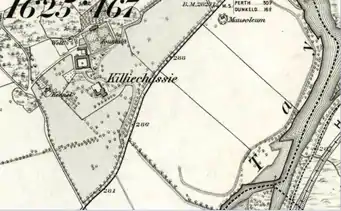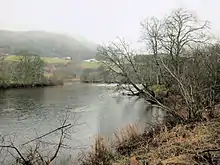Killiechassie
Killiechassie is a country estate and house near Weem, about 1 mile (2 kilometres) northeast of Aberfeldy,[1] in Perth and Kinross, Scotland. The estate lies on the banks of the River Tay in some 12 acres (5 hectares), about 74 miles (119 kilometres) north of Edinburgh. It was owned by the Douglas family in the latter part of the 19th century, and a new house was erected in 1865. A dovecote by the house was listed as Grade B on 9 June 1981. The house was purchased by author J. K. Rowling in 2001.[2]
%252C_Aberfeldy_Home.jpg.webp)
History
Killiechassie Estate has existed for centuries, and historically fell within the civil parish of Logierait.[3] The name Killiechassie means "the church of the steep face" which refers to a church which stood on the hill there.[4] This was part of the earldom of Atholl and was then granted by Máel Coluim, Earl of Atholl, to Scone Abbey in the 12th century.[4]

In the 17th century the estate was owned by members of Clan Murray who were the Dukes of Atholl.[4] Later proprietors of Killiechassie included the Robertson family, who belonged to the house of Struan.[5] In 1727 the estate was owned by the Reverend Robert Stewart, who left money for a chapel to be built there. On his death in 1729 he was buried here, followed by his wife, Anne, a year later.[6] According to legend, Bonnie Prince Charlie was reputed to have sheltered in a sycamore tree here on his retreat to Inverness in 1746 during the Jacobite rising of 1745–46.[7] A small loch in the vicinity is, according to superstition, occupied by a Celtic water spirit.[8]
In 1850 the estate was documented to be held by a Miss Fleming, when it was described by poet David Millar as "almost opposite Aberfeldy, a sweet place, but capable of much greater embellishment."[9] In the later 19th century the estate was owned by the Douglas family, and an Edward Octavius Douglas, nephew of John Douglas, 7th Marquess of Queensberry held it in 1871, and a Hannah Charlotte Douglas by 1892.[10][11] In 1865 the older house was replaced with a new one. The Laird of Killiechassie is listed in the 1956 Scottish Record Society publication A Directory of Landownership in Scotland, c. 1770, ed. Loretta Timperley.[12][8]
On 26 December 2001 British author J. K. Rowling married Neil Murray at Killiechassie, the ceremony being held in the library.[2][13] She had bought the estate a month earlier as a retreat from press and public intrusion. She was reported to have paid £440,000 (£500,000 according to some)[14] for another house which shared the same drive and then paid around £1.5 million for 72 acres (29 hectares) of farmland adjacent to the property.[2]
Architecture

The current house was built in 1865. A freestanding dovecote, built from rubble at this time, is a grade B listed feature, having a "Gothic, symmetrical frontage with centre tower and pyramid roof", with jerkin-head gables.[15][16] However, the house remains classified as a Georgian property,[17] and Country Life notes that it retains the feel of a Georgian building, although with intensive alteration, and now features double-glazing, "mock-Georgian" doors, and "fake stone cladding".[18]
There are two halls, a dining room, a drawing room, a morning room, and seven bedrooms, with a two-bedroom extension on the west wing.[2] The swimming pool is covered with copper domes. Since Rowling has acquired the property she has undertaken extensive security measures, with a state-of-the-art electronic security system, including 6-foot-high (1.8-metre) gates and a CCTV camera, and guards 24 hours a day, seven days a week.[2]
Aberfeldy distillery (part of the Dewar's group), school, Castle Menzies and General Wade's bridge across the Tay at Aberfeldy are in the vicinity.
References
- Johnston's gazetteer of Scotland: including a glossary of the most common Gaelic names, p. 141, at Google Books
- Sexton, Colleen A. (2006). J. K. Rowling. Lerner Publications. p. 94. ISBN 978-0-8225-3423-5.
- Ordnance gazetteer of Scotland: a survey of Scottish topography, statistical, biographical and historical, p. 549, at Google Books
- Breadalbane Historical Society, Killiechassie, Explore Scotland, archived from the original on 7 April 2014
- The Art Journal, p. 54, at Google Books
- Anne Beeson (9 May 2013). "Killiechassie Burial Ground". Highland Perthshire News. Archived from the original on 31 March 2014.
- Tara Womersley (22 November 2001), "Rowling buys a place to potter", Daily Telegraph
- Harry Potter Places Book Five—Scotland at Google Books
- The Tay: A Poem, p. 124, at Google Books
- Burke, Sir Bernard (1871). A Genealogical and Heraldic History of the Landed Gentry of Great Britain & Ireland. Harrison. p. 363.
- Shennan, Hay (1892). Boundaries of Counties and Parishes in Scotland as Settled by the Boundary Commissioners Under the Local Government (Scotland) Act, 1889. W. Green. p. 234.
- A Directory of Landownership in Scotland, circa 1770. Scottish Record Society. 1956. p. 277. Retrieved 27 June 2019.
Laird of Killiechassie: Pitcastle
- J.K. Rowling: A Biography, p. 217, at Google Books
- "Rowling retreats to banks of the Tay Author pays £500,000 for historic Perthshire house". The Herald. Scotland. 21 November 2001. Retrieved 30 March 2014.
- "Killiechassie, Dovecot". Britishlistedbuildings.co.uk. Retrieved 30 March 2014.
- John Gifford (2007), "Doocots", Perth and Kinross, Yale University Press, p. 90, ISBN 9780300109221
- Beahm, George; Kirk, Tim (28 February 2007). Muggles and Magic: An Unofficial Guide to J.K. Rowling and the Harry Potter Phenomenon. Hampton Roads Publishing. p. 19. ISBN 978-1-57174-542-2.
- Country Life. 1988. p. 64.